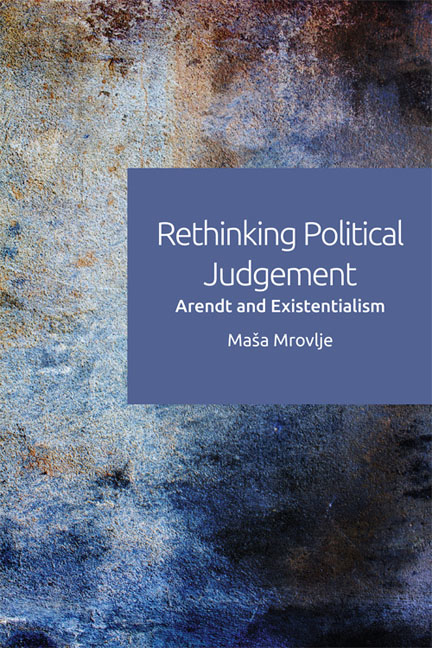Book contents
- Frontmatter
- Contents
- Acknowledgements
- Introduction
- 1 Political Judgement in the History of Political Thought and the Modern Crisis
- 2 Sartre and Beauvoir: The Ambiguity of Political Judgement and the Challenge of Freedom and Responsibility
- 3 Camus and Arendt: Confronting the Ambiguity of Political Judgement and Illuminating the Limits of the World
- 4 Political Judgement and Narrativity
- 5 Facing Up to the Tragedy of Political Action: The Problem of Dirty Hands
- 6 Times of Transition: Reconciling with the Tragic Nature of Political Affairs
- Conclusion: Reclaiming Wonder at the World of Political Affairs
- Bibliography
- Index
Introduction
- Frontmatter
- Contents
- Acknowledgements
- Introduction
- 1 Political Judgement in the History of Political Thought and the Modern Crisis
- 2 Sartre and Beauvoir: The Ambiguity of Political Judgement and the Challenge of Freedom and Responsibility
- 3 Camus and Arendt: Confronting the Ambiguity of Political Judgement and Illuminating the Limits of the World
- 4 Political Judgement and Narrativity
- 5 Facing Up to the Tragedy of Political Action: The Problem of Dirty Hands
- 6 Times of Transition: Reconciling with the Tragic Nature of Political Affairs
- Conclusion: Reclaiming Wonder at the World of Political Affairs
- Bibliography
- Index
Summary
The [modern] loss of standards […] is a catastrophe in the moral world only if one assumes that people are actually incapable of judging things per se, that their faculty of judgement is inadequate for making original judgements, and that the most we can demand of it is the correct application of familiar rules derived from already established standards.
Hannah Arendt, The Promise of PoliticsHow are we to reinvigorate the human capacity for political judgement as a practical activity capable of confronting the plural and ambiguous character of our postfoundational world? In the face of pervasive injustice and suffering that continuously confound our moral expectations, it is easy to feel overwhelmed and seek solace in despair. More often than not, our judgements and actions seem obliterated under the weight of larger forces and processes, to the point of making the most steadfast pursuit of moral ideals end in disaster. Even though increasingly interconnected across temporal and spatial boundaries, we hit upon walls of difference, ideological division and hatred. These quandaries foreground political judgement as a topic of fundamental existential import, pertaining to the meaning of our lives and our relationship to the world and others. While political judgement has of late assumed increasing prominence in political theory, the questions of its concrete, human reality and significance remain obscured under the preoccupation with proper standards or grounds. It is now more than fifty years since another generation of thinkers awarded these questions the status of utmost philosophical relevance. Responding to their own horizon of betrayed hopes for universal human emancipation, twentieth-century philosophies of existence approached the dilemmas of political judgement as they are lived, in the ambiguity of a particular historical situation that cannot be congealed in an abstract system of rules. In our present era of uncertainty and disillusion, this book seeks to reclaim their voice, focusing in particular on the work of Jean-Paul Sartre, Simone de Beauvoir, Albert Camus and Hannah Arendt.
Part of a highly variegated intellectual tradition, the four thinkers are distinguished for their particularly bold insertion into history. Sartre, Beauvoir and Camus are often regarded as forming the definitive expression of the twentieth-century existentialist movement. Even though he denounced the label, Camus shared with Sartre and Beauvoir the engaged tone and import of existential philosophising, as well as a steadfast commitment to the social and political concerns of their age.
- Type
- Chapter
- Information
- Rethinking Political JudgementArendt and Existentialism, pp. 1 - 21Publisher: Edinburgh University PressPrint publication year: 2017

